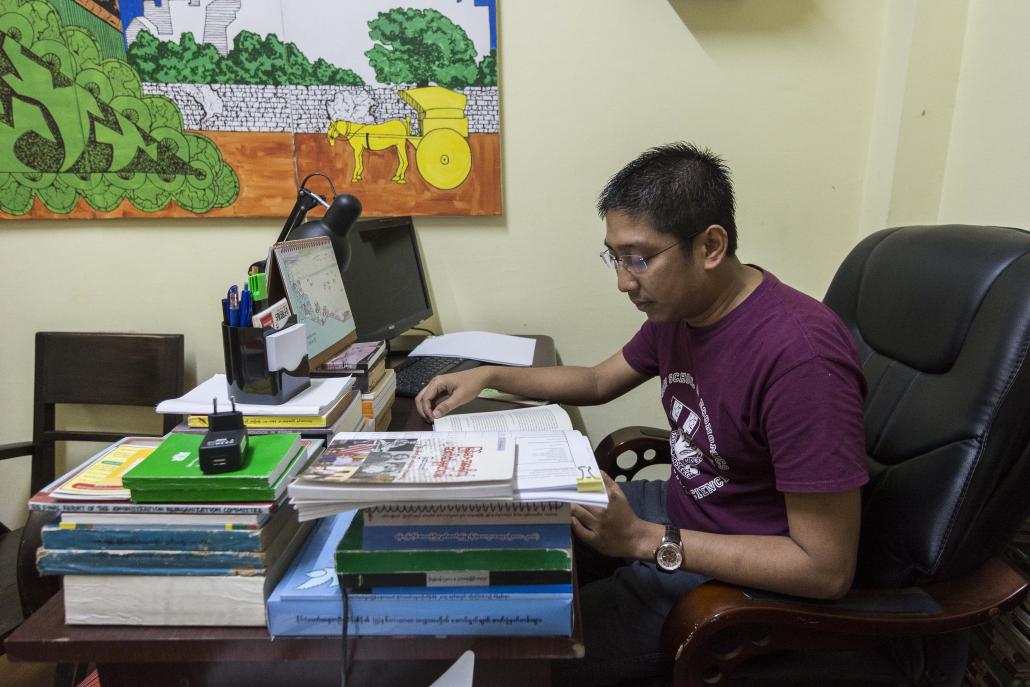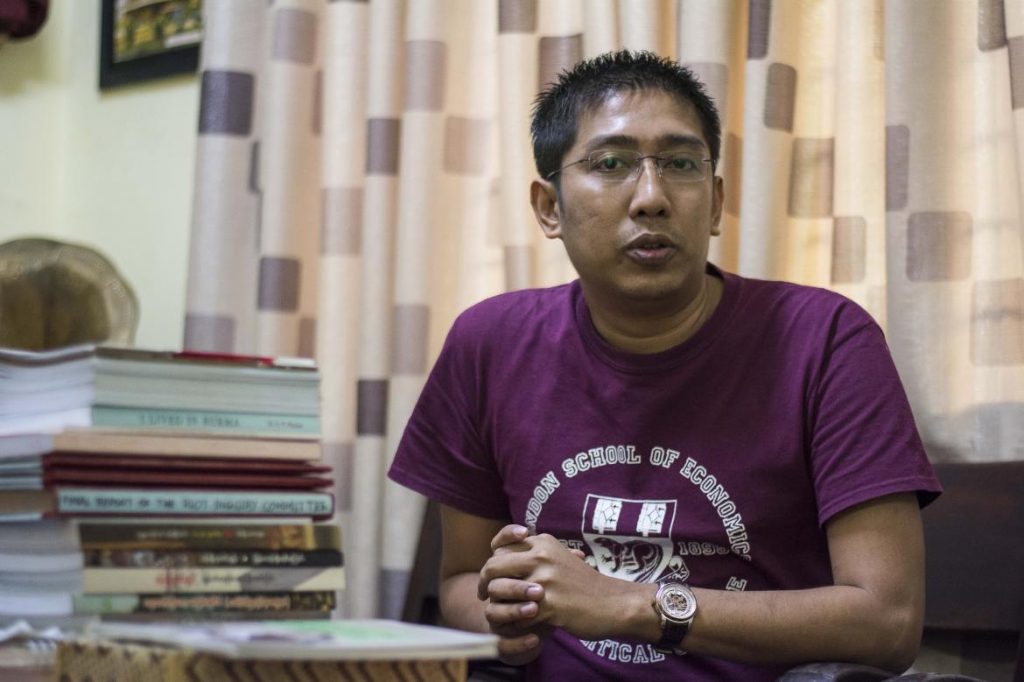By KYAW PHONE KYAW | FRONTIER
THE TAGAUNG Institute of Political Studies was established in 2014 by nine former activists, including founding members of the Yangon School of Political Science. The institute closely monitors the Myanmar Armed Forces, and has released several papers about the Tatmadaw and the National Defence and Security Council, which is responsible for security and defence affairs in Myanmar.
Ko Ye Myo Hein, executive director of TIPS, spoke to Frontier about the relationship between the government and the military and how Myanmar can achieve lasting peace.
Why is it important to monitor the Tatmadaw, especially at this time?
As Myanmar is transitioning from a military junta to a civilian-led democracy, military affairs is a very important issue.
The transition can be impacted by what the military does. If we are not knowledgeable about military matters, then it makes the democratic transition difficult to understand. This is why we think it is important to study the civilian-military relationship.
We conduct international case studies and share our knowledge. And we also study the domestic military-related situations and contact key people involved in their own transitions [in other countries] and ask for their feedback.
What is your view on the current civilian-military relationship?
As we all know, the military had all political powers in the past, but is withdrawing gradually from politics. However, they still hold a lot of power and we have found three issues with the military.
Support more independent journalism like this. Sign up to be a Frontier member.
One is what we call the indoctrination problem. What I mean is that they think they have to lead and guard the country. Some call it guardianship and [the military] believes in this very strongly.
The next issue is an institutional one. They are not a professional military outfit yet. They have a lot of things to do to become a professional military. The codes of conduct are not strong enough and they have notorious human rights abuses that they need to solve.
Then the third problem is a political problem. They are heavily involved in political affairs by having seats in parliament and the cabinet. If we talk about a civilian-military issue, we also have to talk about an ethnic-military issue. The military has problems with ethnic groups also.
So there are three issues. The commander-in-chief has said they will form a professional army. If they want to do that, then they have to solve these three problems.
Now the first civilian government since 1962 has taken power. The military and civilian government need to cooperate to solve these issues.
What happens if the military does not want to solve these issues?
The first thing is that they wouldn’t be able to form a professional military. And the political clash between the military and the government elected by the people will be bigger. Meaning it will be a clash between the people and the military.
So the consequences will be that the government cannot make political discussions with full power and the people won’t believe in the political process. The development of the political process will be slow and the ethnic groups won’t believe in the political decisions. The peace process will be severely affected.
What do you think the solutions are?
We cannot solve the problems in a day. The most important thing is trust. The trust I am talking about is the trust between the generals and the civilian government, the generals and the ethnic groups, then the generals and the people. This trust has to be built gradually. Now is a good chance to change this situation and the opportunity shouldn’t be missed.
Do you think the military is willing to amend a constitution that is favourable to them?
The commander-in-chief said [the military] will withdraw from politics and parliament if the peace process is successful. So we have to ask what kind of peace he is talking about. I think now is best time for the military to build trust.
On the other hand, the politicians should show their capability. In this country when it was under the junta, there was no such thing as politics. So the politicians have weaknesses, but they have to show their ability.
The politicians also have to follow democratic criteria. They must avoid misusing their elected power and must build strong democratic institutions.
And then, mutual security is also important.
What do you mean by mutual security? Do you mean the government must not threaten the interests of military officers?
Mutual security is not directly linked to the interests of the military officers. Let’s say, the military might feel insecure after the civilian politicians won the election and heavily interfere in affairs. And then, if the civilian politicians don’t give enough budget to the military while they are fighting civil war, the military might feel insecure in terms of economy. I am talking about this kind of security. They, the two sides, have to think about each other.
tzh_ye_myo_hein7.jpg

Ye Myo Hein in his Yangon office. (Teza Hlaing / Frontier)
The military says they are still needed in politics, while democratic groups say their involvement in politics is making the situation more difficult. How can these competing views be balanced?
The military has been involved [in politics] for decades and have indoctrinated themselves for generations via military-owned institutions. So they are rooted massively and it is very hard to change that. The democratic groups need to understand that.
I think exposure to international practices is needed to change this. The education system of the military must be changed, and also the civilian politicians need to understand the military culture. According to the current situation, the politicians should involve the military, rather than leaving them behind. By implementing changes step-by-step, their guardianship will fade gradually.
Thura U Shwe Mann is regarded by some as being disliked by the military for trying to push for changes to the constitution. With this in mind, do you think Daw Aung San Suu Kyi’s decision to give him a prominent role in the new government could have an impact on the government’s relations with the military?
No, I don’t think so. National leaders like Daw Aung San Suu Kyi, [President] U Htin Kyaw and Commander-in-Chief Senior General Min Aung Hlaing can put aside personal feelings. And the commander-in-chief has said repeatedly that the military is cooperating with the new government. So I don’t think it creates a problem.
During U Thein Sein’s tenure, one team was negotiating the peace process while offensives were taking place by the Tatmadaw in ethnic armed areas. Now the NLD is planning to hold its 21st Century Panglong conference. Do you think it is possible to achieve peace in the new government’s term?
Before discussing the main issues, they have to negotiate about the confrontations between troops first. The new government has already formed a monitoring group for that, but violence is still a possibility. It is a challenge for the peace process but it doesn’t destroy everything.
And the military and the ethnic armed groups have to change things. They are negotiating for peace but they still hold this fatal and total concept of war that the enemy must collapse. Now, I think we are seeing the peace and political process happening, but the war concept has not yet changed.
Likewise, this time it is different. In U Thein Sein’s term, the people and ethnic groups thought the government and the military were the same. But now people know that the government and the military are not the same.
In parliament, even though the military is guaranteed a quarter of all seats, the military MPs are losing nearly all debates because of the NLD’s dominance. What are some of the potential consequences of that?
The military has the 2008 Constitution, and the NLD has the popular mandate from the election. So the two sides have to understand each other’s position.
On the other hand, the civilian government and politicians should gain the trust of the military, so that they focus on implementing democracy rather than winning arguments in parliament.
How do you see the military’s view on the current peace process?
I don’t see anything particularly striking at this point. Now, meetings are being held. We know that Lieutenant General Yar Pyae [vice chairman of the Joint Monitoring Committee] and his team are collaborating in the peace process, but we don’t know yet what level of understanding and trust has been built between both sides.
Nonetheless I don’t see any rejection from the military side of the second Panglong conference, which has been organised by the NLD. The Panglong conference is a good image for the country, so the military needs to agree to it.







